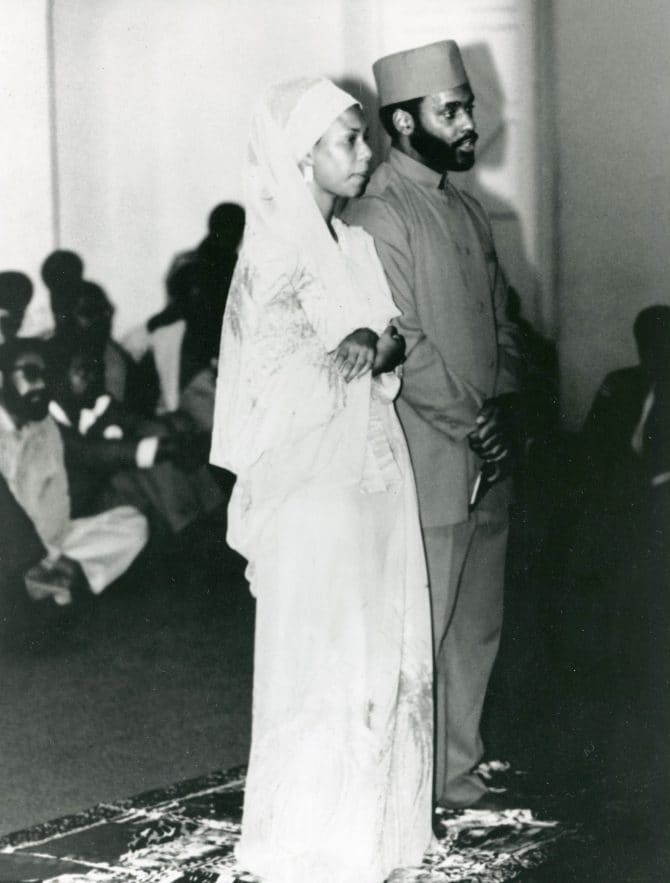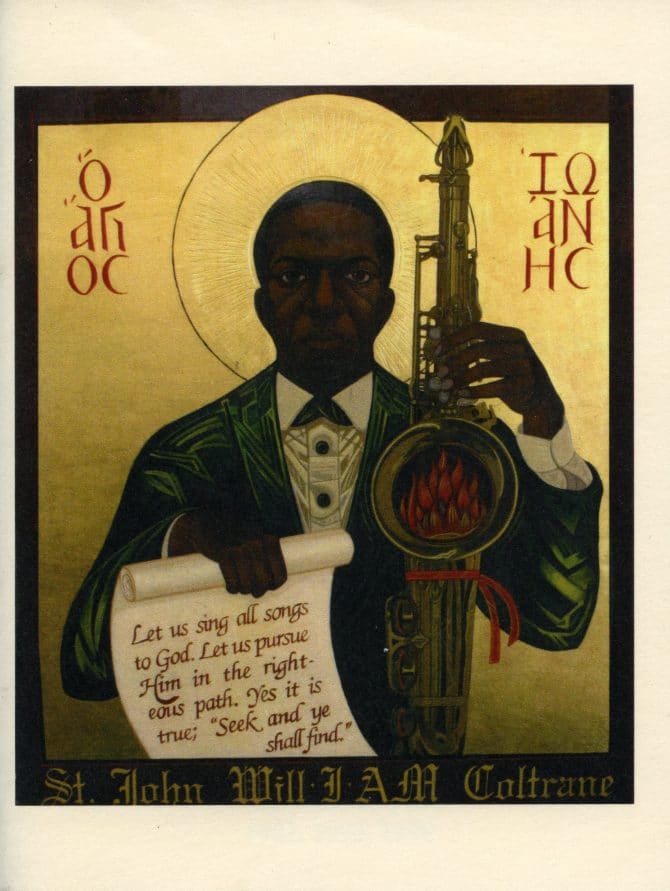
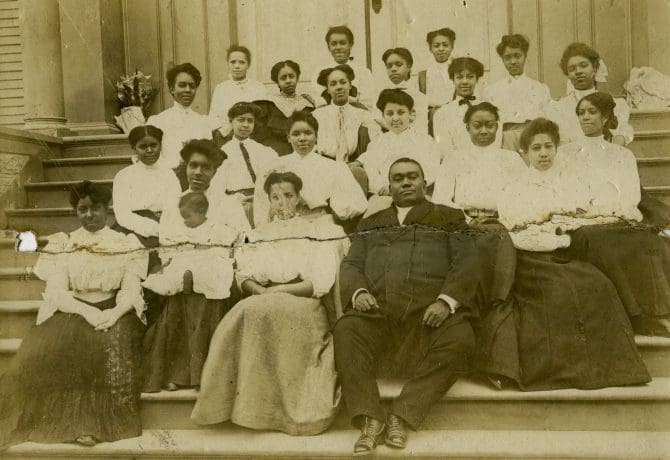
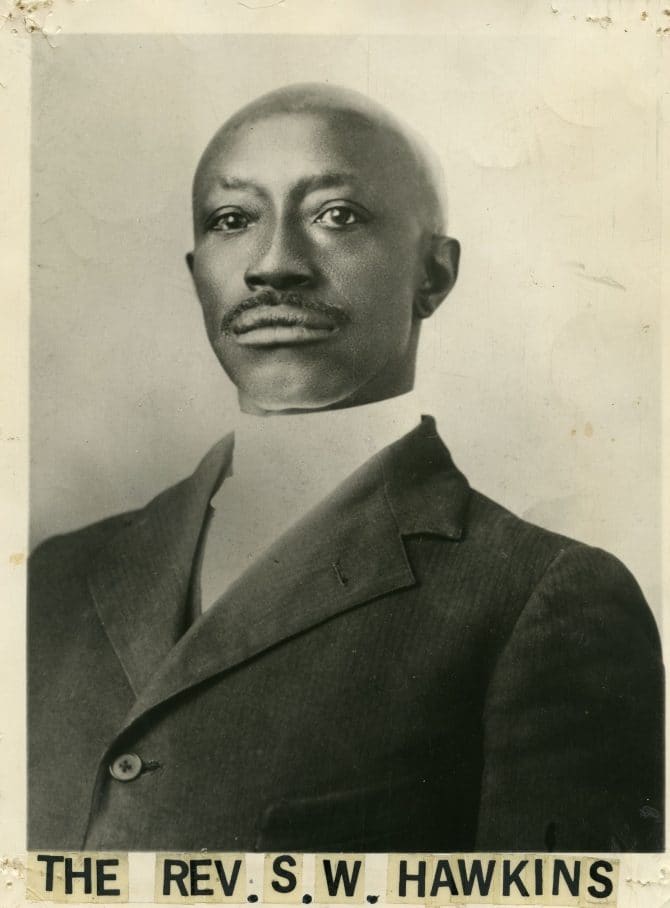
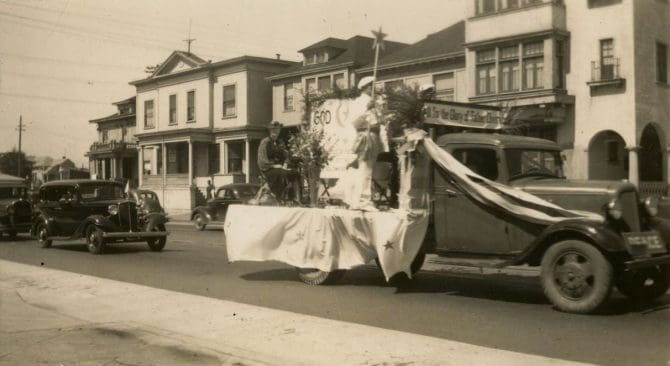
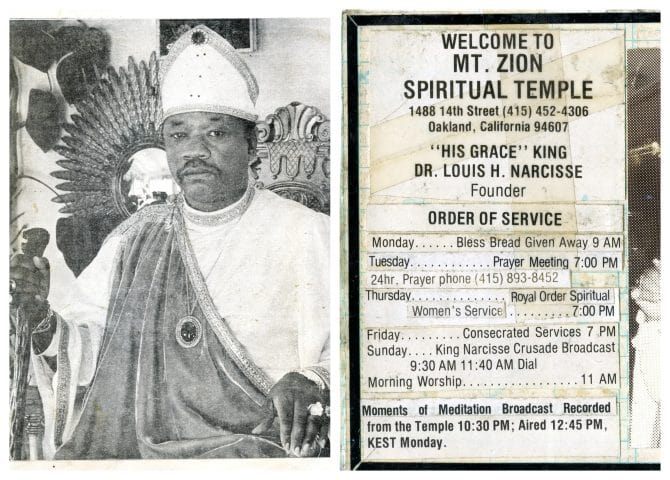
Prepare for a visit to AAMLO with these special topic resource guides.
This resource guide is intended to help users locate holdings at AAMLO related to African American communities of faith encompassing a wide range of worship practices and beliefs. Materials related to the Black Church, one such expression of religious community, are particularly well represented in AAMLO's archives.
● Selected Library Material at AAMLO
● Selected Archival Collections at AAMLO
Other collections may contain relevant materials. Please contact AAMLO (aamlo@oaklandlibrary.org) with any questions or to schedule an appointment to view materials in person.
Selected Library Materials
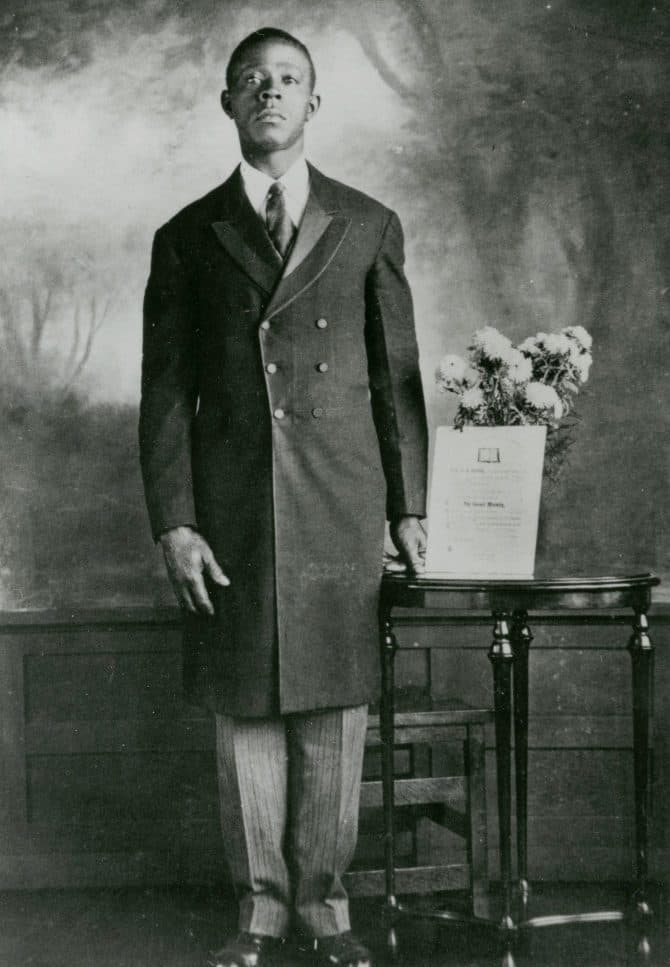
The Encyclopedia of African and African American Religions
Encyclopedia of African American Religions
Down, Up, and Over: Slave Religion and Black Theology by Dwight N. Hopkins
Black Belief: Folk Beliefs of Blacks in America and West Africa by Henry H. Mitchell
Black Religion and Black Radicalism: An Interpretation of the Religious History of Afro-American People by Gayraud S. Wilmore
Diaspora Conversions: Black Carib Religion and the Recovery of Africa by Paul C.Johnson
Major Black Religious Leaders, 1755-1940 by Henry J. Young
Segregated Sabbaths; Richard Allen and the Emergence of Independent Black Churches 1760-1840 by Carol V. R. George
Black Indians and Freedmen: the African Methodist Episcopal Church and Indigenous Americans, 1816-1916 by Christina Dickerson
From Labor to Reward: Black Church Beginnings in San Francisco, Oakland, Berkeley, and Richmond, 1849-1972 by Martha C. Taylor
Daughters of Thunder: Black Women Preachers and Their Sermons, 1850-1979 by Bettye Collier-Thomas
Black Crescent: the Experience and Legacy of African Muslims in the Americas by Michael Angelo Gomez
Garveyism as a Religious Movement: the Institutionalization of a Black Civil Religion by Randall K. Burkett
New World A-coming: Black Religion and Racial Identity During the Great Migration by Judith Weisenfeld
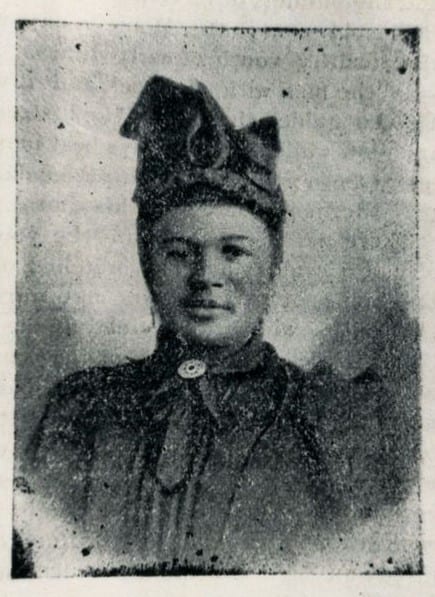
Witnessing and Testifying: Black Women, Religion, and Civil Rights by Rosetta E. Ross
Black Muslim Religion in the Nation of Islam, 1960-1975 by Edward E. Curtis
Those Who Know Don't Say: the Nation of Islam, the Black Freedom Movement, and the Carceral State by Garrett Felber
The Promise of Patriarchy: Women and the Nation of Islam by Ula Y. Taylor
Black Paradise: the Rastafarian Movement by Peter B. Clarke
Black Zion: African American Religious Encounters With Judaism edited by Yvonne Patricia Chireau
Black Saints in a White Church: Contemporary African American Mormons by Jessie Embry
The Coltrane Church: Apostles of Sound, Agents of Social Justice by Nicholas Louis Baham, III
Thus Far by Faith: a Study of Historical Backgrounds and the First Fifty Years of the Allen Temple Baptist Church by J. Alfred Smith
Understanding Jonestown and Peoples Temple by Rebecca Moore
Beyond Christianity: African Americans in a New Thought Church by Darnise C. Martin
Afrikan Wisdom: New Voices Talk Black Liberation, Buddhism, and Beyond edited by Valerie Mason-John
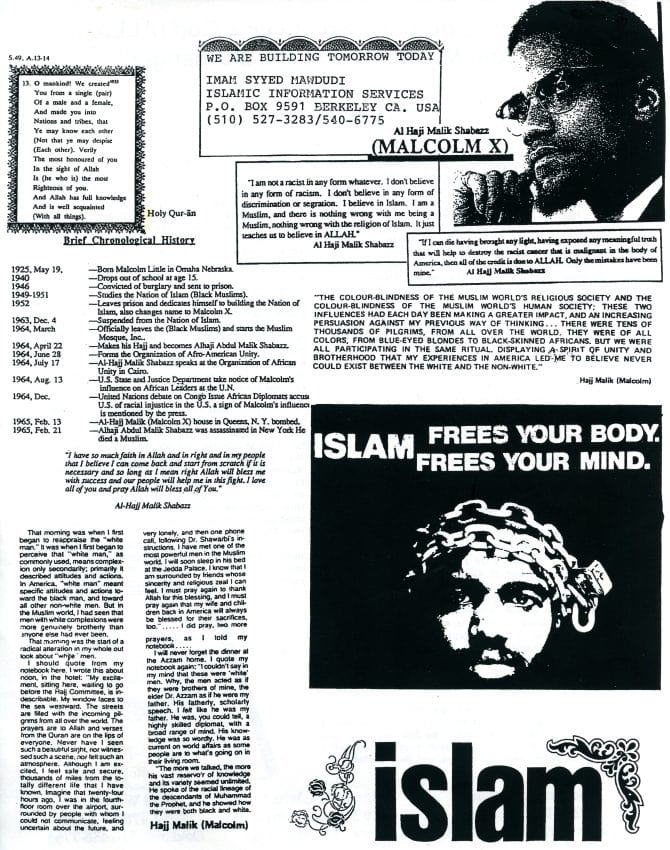
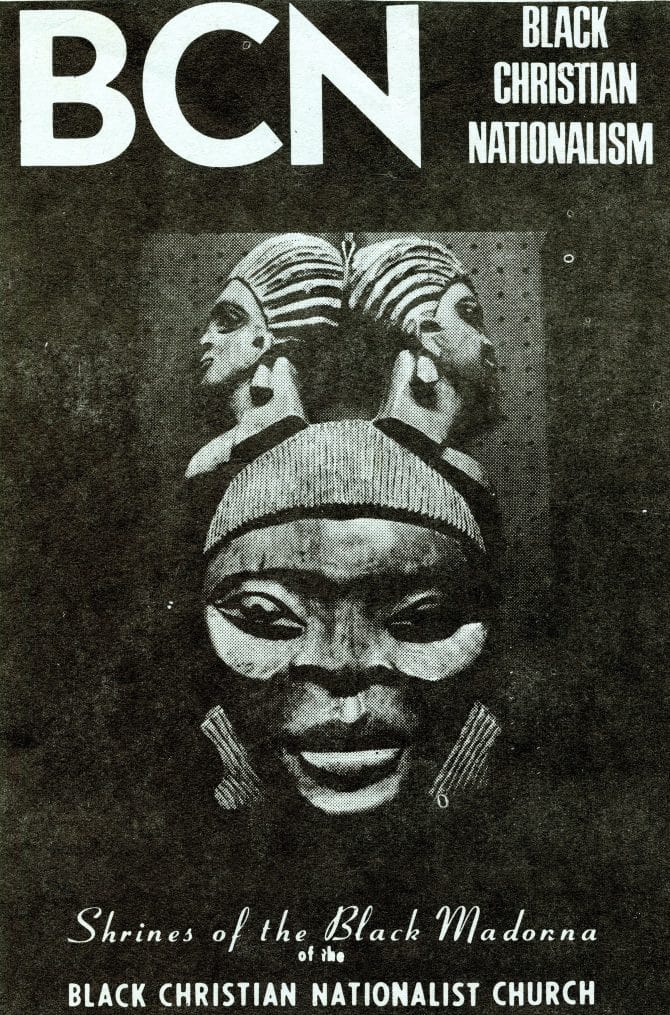
Selected Archival Collections
Friends of Negro Spirituals Oral History Collection. The Friends of Negro Spirituals is a educational and cultural organization based in Oakland, California dedicated to the preservation and promotion of Negro spirituals. Founded in 1998 by Sam Edwards and Lyvonne Chrisman, the Friends of Negro Spirituals offers lectures and radio programs on Negro spirituals, research assistance to scholars studying Negro spirituals, and publishes a news journal, The Negro Spiritual. The Friends of Negro Spirituals Oral History collection consists of DVDs and transcriptions of ten oral history interviews conducted in 2007 with supporters of Negro spirituals who work to preserve spirituals in the African American community.
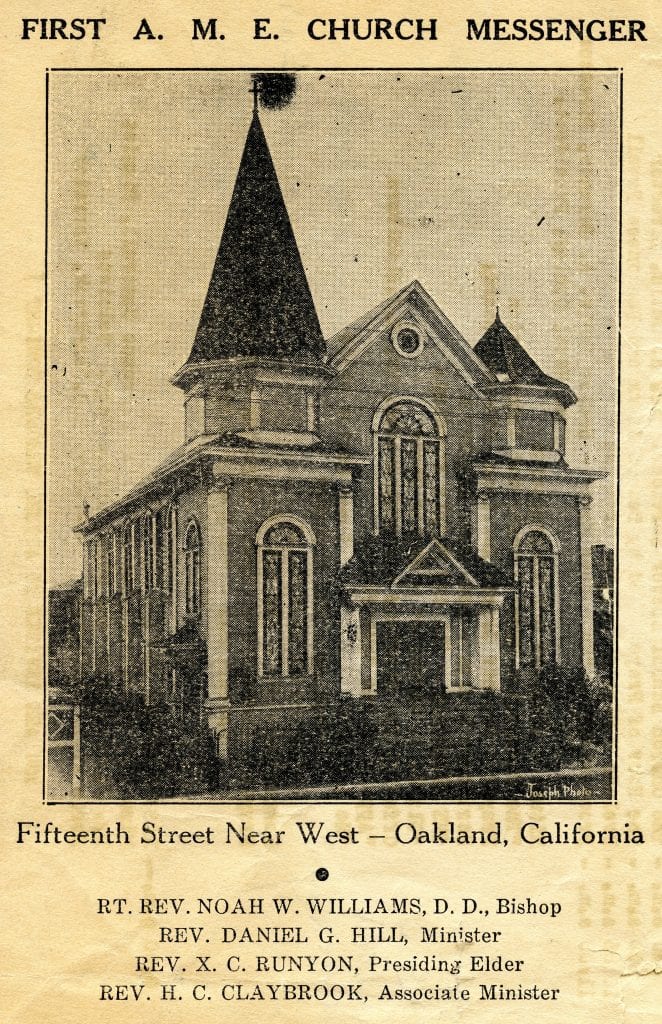
First African Methodist Episcopal Church (Oakland, Calif.) Collection. The First African Methodist Episcopal (A.M.E.) Church of Oakland was the first African American church to be founded in the East Bay, and the only one in Oakland for more than three decades. It was the first school for minorities in Oakland, since only white children were allowed to attend public schools at this time. The A.M.E. Church also acted as the cultural center of the African American community, hosting not only the first church and school, but social and political clubs, events, and festivals. The First A.M.E. Church of Oakland began in 1858 by a small group of Oakland residents, and is the oldest African American church in Oakland. The church founders purchased the Carpenter School House in 1863, which became the first church building. At this time the church was called Shiloh A.M.E. Church, and it also acted as a school for minorities; the teacher was one of the A.M.E. church founders, Elizabeth Flood. In 1884, Reverend James Grisby led the congregation to a larger church building on 15th Street in Oakland, known as the Fifteenth Street Church. In 1949, Reverend H. Solomon Hill became pastor, and in 1954, led the congregation to a new church building at 3701 Telegraph Avenue, where it was renamed the First African Methodist Episcopal Church. The collection includes administrative records, correspondence, church service bulletins, events programs, photographs, and collected newspaper clippings.
Flood Family Papers. The Flood family was one of the earliest and most prominent African American families to settle in Oakland, California. In 1857, Elizabeth Flood opened a private school in the Flood home for African American students, which was moved to the First African Methodist Episcopal Church in 1863 and operated for three years before closing in 1866. The Flood Family Papers includes 18 photographs, Lydia Flood Jackson’s funeral program, and two letters written by Lydia Flood Jackson to Ruth Lasartemay. Included in the collection is a tintype portrait of Oakland’s first African American school teacher, Elizabeth Scott Thorn Flood, taken mostly likely in the 1850s.
Earline Woods Photograph Collection. The Earline Woods photograph collection consists of 58 photographs of African American churches, families, and civic organizations in Sacramento, California. Church photographs include photographs of the congregations and choirs at St. Andrews A.M.E., Kyle A.M.E., and Shiloh Baptist churches in Sacramento, California.
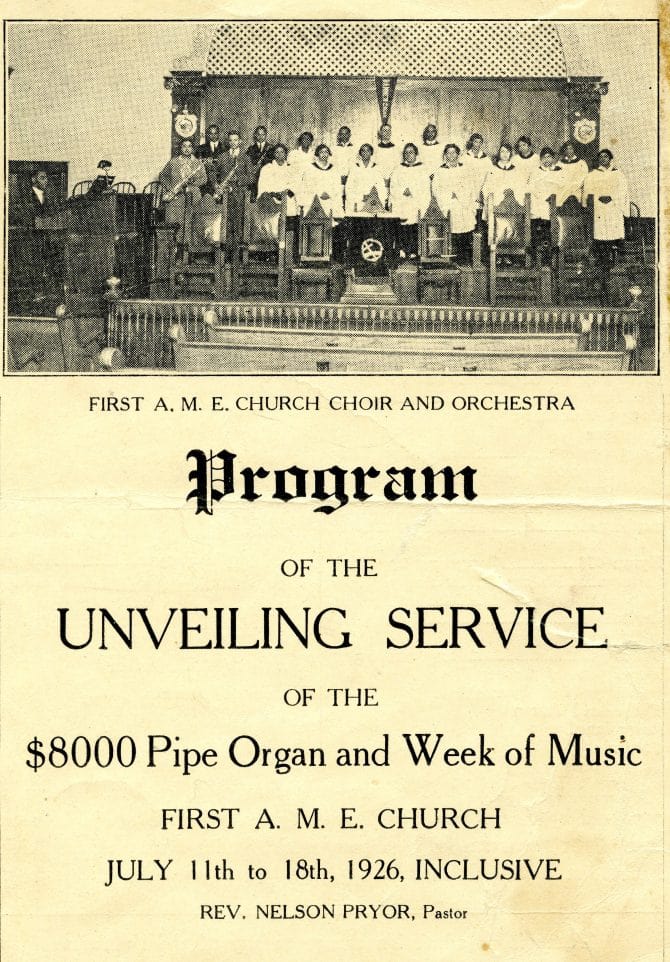
Roberts Family Papers. After completing her degree and a summer session at the Boston Conservatory of Music, Pearl Hinds Roberts accepted a position as teacher in the music department at the State Normal College of South Carolina at Orangeburg. She later became department head and developed a deep interest in negro spirituals as a result of hearing them sung by her students. Upon her return to Oakland, she accepted a position as a church organist and became the first African American female pipe organist in Northern California. She also taught piano and started a chorus, the Etude Musical Club, which performed spirituals along with popular songs. On November 30, 1921, Hinds married Frederick Roberts and moved to Los Angeles. She continued her musical activities at the First A.M.E. Church at Eighth and Towne, serving as organist, choir director, and founder of the Clef Club.
Ruth Beckford Papers. Dancer, teacher, and author Ruth Beckford was born on December 7, 1925 in Oakland, California, the youngest of four children of Cora and Felix Beckford. Both her parents were active in Marcus Garvey’s Universal Negro Improvement Association; her father served as secretary of the U.N.I.A. Oakland Branch and her mother worked as a Black Cross nurse. After graduating UC Berkeley in 1947, she founded and directed the first recreational modern dance program in the country teaching dance classes for the Oakland Recreation Department. In 1954 Beckford started her own dance company, Ruth Beckford African-Haitian Dance Company, which toured across the country performing African and Haitian dances. In the same year, Beckford opened dance studios in Oakland and San Francisco offering classes in African-Haitian dance using the Dunham technique. The Ruth Beckford Papers include dance programs and material related to Beckford's trips to Haiti, interest in vodou, and her studies in the spiritual aspects of the music and dances of Haiti.
W. Hazaiah Williams Papers. Following his graduation in 1955, William Hazaiah Williams Jr. (1930-1999) moved to San Francisco, California where he became the minister of religious education at the Church for the Fellowship of All Peoples at the invitation of Howard Thurman. A year later he was ordained as a minister at the South Berkeley Community Church, but his standing as a minister was later revoked by the Congregational Church, which led him to found The Church for Today in Berkeley, California, a multicultural, interdenominational church where he was minister for over forty years until his death. In 1967, he founded the Alamo Black Clergy, an interdenominational consortium of Black ministers in the East Bay that advocated for civil rights, and the East Bay Conference on Race, Religion, and Social Justice. In 1969, Rev. Williams submitted a prospectus for The Center for Urban-Black Studies which envisioned a theological center that would meet the needs of Black clergy and the Black community. The Center provided a foundation in the history and theology of the Black church to seminary students at the member institutions of the Graduate Theological Union, offering continuing education to Black clergymen, and also implemented programs that would allow the church to respond to the need for skills development, leadership training, religious perception, and interpretation. The W. Hazaiah Williams papers consists of the administrative files of the Center for Urban-Black Studies and assorted subject files, photographs, notebooks, and printed material collected by W. Hazaiah Williams.
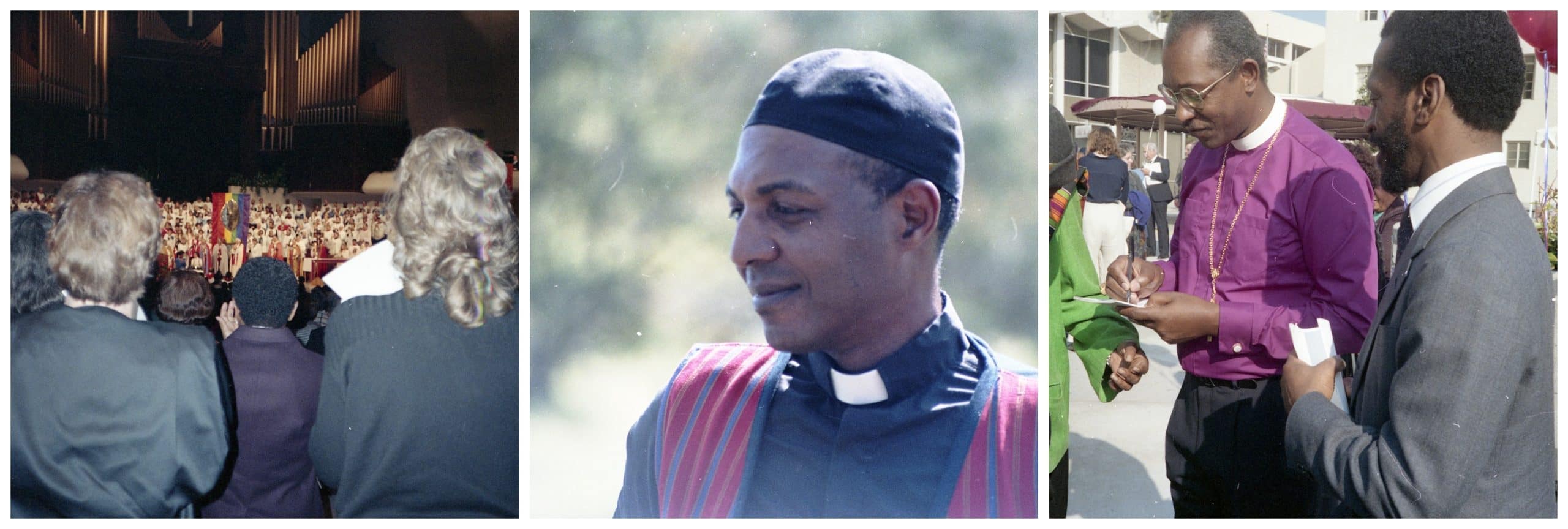
African American Museum & Library at Oakland Audiovisual Collection. Selected items include:
- "From Black Muslim to Muslim" seminar given in Oakland by Imam Saadiq Saafir, circa 1980s. Saadiq Saafir was Imam of Masjid Ibaadillah, a Los Angeles mosque on West Jefferson Boulevard. He was co-founder of the Islamic Shura Council of Southern California, participated in the first Islamic conference on apartheid, and was a lecturer at the California state prison system. In the recording Imam Saadiq Saafir discusses issues affecting California's Black Muslim community. [Listen online]
- Dr. J. Rupert Picott delivering the mass meeting of the 29th observance of Afro American Month at the Second Baptist Church, Los Angeles, California, February 13, 1977 [Listen online]
African American Museum & Library at Oakland Oral History Collection. Selected interviews include:
- Rev. Louis J. Bartholomew discussing his work with the community at Allen Temple Baptist Church [View online]
- Frances Dunham Catlett discussing her family's history in the church, following Rev. Howard Thurman to California, and her work as a social worker and artist [View online]
- Rev. Carl and Beverly Kennedy discussing their migration to California from Texas in the 1960s, their families' shared history, and their association with social movements and programs in Oakland [View online]
- Bishop Aurea Lewis discussing her religious work [View online]
- Bishop Ernestine Reems discussing her ministry in East Oakland [View online]
- Susan Richardson discussing her involvement with social movements during the 1960s, the Church of Synanon, and the Black Panther Party [View online]
- Rev. J. Alfred Smith Sr. discussing his family's migration to Oakland, California in the 1960s [View online]
- Rev. Allen Williams discussing growing up in a religious family in Oakland, California [View online]
- Oral history interview with Rev. Herbert Guice, minister of Bethel Missionary Baptist Church, discussing his experiences as a Baptist minister and long-time champion for housing, education, and civil rights [View online]
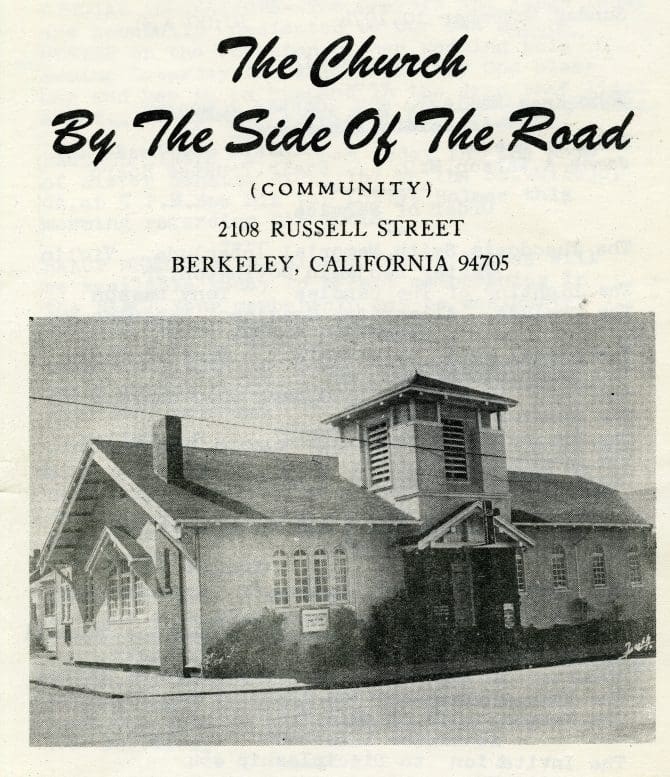
Deitra Moore-Atkins Collection. The Dietra Moore-Atkins collection consists of church programs, conference programs, funeral programs, membership reports, sermon outlines and assorted religious handouts mostly of Baptist churches in the San Francisco Bay Area in the 1960s-1980s. The collection is organized in to six series: Church programs, Conference programs, funeral programs, membership reports, religious handouts, and sermon outlines.
Warren Moore Audio Recordings Collection. The Warren Moore Audio Recordings Collection consists of 1633 audiocassettes. The bulk of the collection consists of sermons and church programs of African American Baptist churches in Oakland, California, including church recordings at Friendship Baptist Church, Evergreen Baptist Church, and Allen Temple Baptist Church. Sermons and church programs are organized by church and chronologically by date thereafter. The collection includes sermons by many pastors from Oakland and visiting pastors from Texas and Illinois including Michael L. Moore, J.L. Richard, Frank Pinkard Jr., C.A.W. Clark, J. Alfred Smith Sr., Jeremiah Wright Jr., and E.K. Bailey. Church recordings also include sermons delivered at the annual Oakland City Revival at Baptist churches in Oakland and at the Oakland Auditorium. Many of the sermons document the social and spiritual concerns of African American pastors in Oakland, California in the 1970s-1990s.
Sylvia Anna Magruder Papers. Sylvia Anna Magruder (née Duncan) was born on July 1, 1880 in New Orleans, Louisiana the youngest daughter of Rev. Stephen Duncan and Sylvia Duncan. She graduated from New Orleans University and worked as a teacher and matron for ten years before marrying Rev. E.J. Magruder in 1908. The couple moved to California the following year, and in 1926 E.J. Magruder was appointed as the pastor at the First A.M.E. Church in San Francisco, California. Sylvia Anna Magruder served various civic and religious organizations in the San Francisco area, including the San Francisco Buchanan St. YWCA and Woman's Home and Foreign Missionary Society of the African Methodist Episcopal Zion Church.
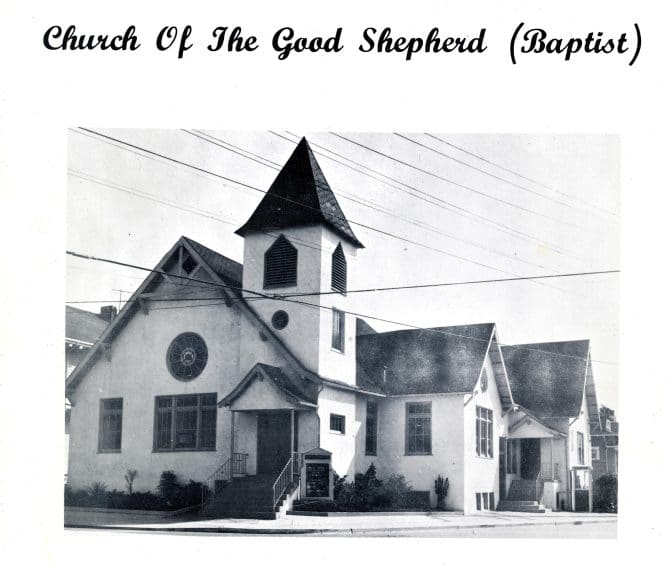
Lasartemay Family Papers. Co-founders of the East Bay Negro Historical Society, Eugene Pasqual Lasartemay (1903-1993) and Ruth Hackett Lasartemay (1902-1991) were instrumental in the establishment of the Church of the Good Shepherd. On October 21, 1956, a group of seventeen members disunited their membership from Beth Eden Baptist church over the selection of the Reverend Dones to be pastor of Beth Eden. The first meeting took place in the home of the Lasartemays. The group quickly grew to forty-two persons and functioned under the name "Progressive Religious Workers." On March 10, 1957, the members were officially organized as the Church of the Good Shepherd in the Lasartemay home by the Reverend W.C. Sample, and theologian the Reverend Dr. Henry H. Mitchell. The Lasartemay papers document the couple’s participation in various civic organizations and include testimonial programs held at the Church of the Good Shepherd.
Jesse W. and Marcella Ford Papers. The Jesse W. and Marcella Ford Papers includes correspondence, clippings, photographs, reports, and artifacts that document the life and activities of Jesse W. and Marcella Ford. Upon arriving in Oakland, the Fords became active in Beth Eden Baptist Church. Jesse Ford served as a member of the Board of Deacons of United Beth Eden Baptist Church for over 30 years. Marcella Ford was involved with the Beth Eden Christian Education Program and helped to establish the Board of Education at the church. On July 2, 1965, the East Bay Negro Historical Society (EBNHS) was organized in their home with Jesse Ford and Marcella Ford as founding members of the society. The Fords remained committed throughout their lifetime to the society's mission to “collect, preserve, record, and disseminate information related to the history, culture and experience, of persons of Black American and African descent, especially those in the East Bay, the State of California and throughout the West.”
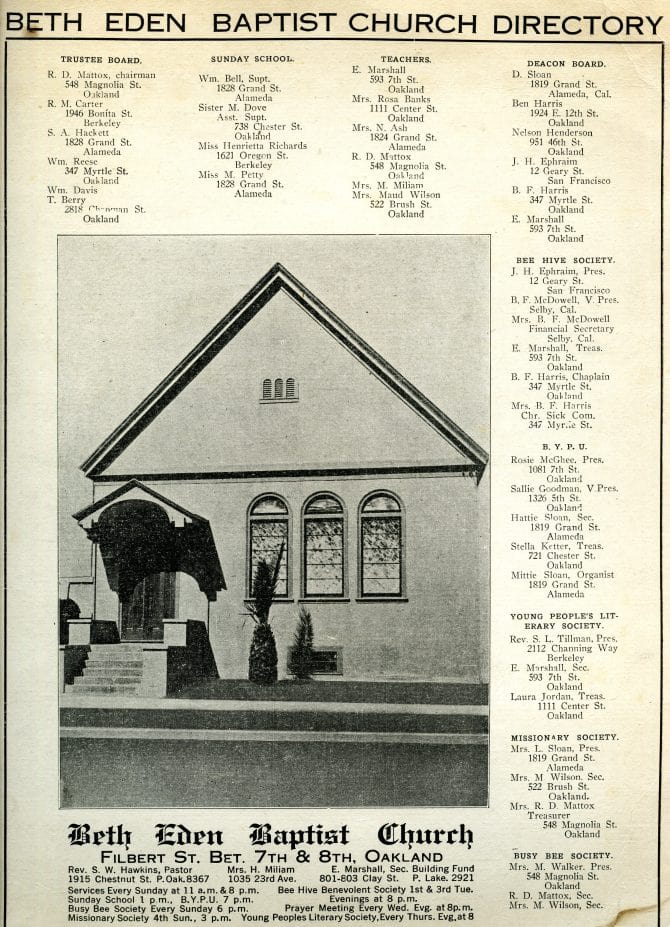
Tarea Hall and William Pittman Papers. The Tarea Hall and William Pittman Papers includes photographs, correspondence, awards, certificates, financial and legal records, newspaper clippings, programs, audio recordings, and ephemera documenting the life and careers of William Pittman and Tarea Hall Pittman. Included are photographs documenting the South Berkeley Community Church United Church of Christ and a photograph album of the Intercultural Interfaith Fellowship of the East Bay includes sidewalk snapshots of speakers and members of the choir entering and leaving the fellowship service, and photographs of members at fellowship board meetings and a potluck dinner.
Hickerson Family Papers. The Hickerson Family Papers includes photographs, newspaper clippings, cards, programs, certificates, and musical scores related to the Hickerson and Swayzee families and their friends. The papers also document the Hickerson Family's involvement with the Oakland, CA First African Methodist Episcopal (First A.M.E.) Church and other Christian and civic organizations.
Alice Royal Collection. In addition to her work with Colonel Allensworth State Historic Park, Alice Royal spent much of her middle and late years collecting Hickerson and Calbert family histories. As legal executor of Dorothy Hickerson Harris (1916-1989), Royal assembled material related to Hickerson Harris’ active participation in the First A.M.E. Church, Oakland, California. The bulk of material relates to First African Methodist Episcopal (First AME) Church activities and its members, as collected by Hickerson Harris, and U.S. Army chaplain William E. Calbert service and chaplaincy career.
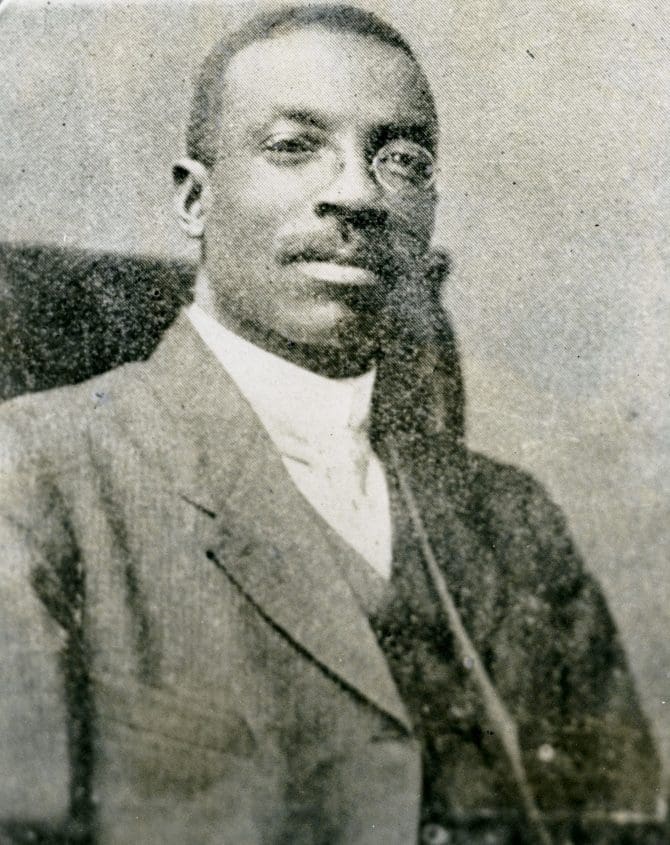
James Alfred Smith Scrapbooks. The James Alfred Smith papers consists of two scrapbooks which document Smith's career between 1961 and 1983 as Pastor of the Allen Temple Baptist Church in Oakland, California. They consist primarily of clippings relating to Smith's appointments and activities, his participation in conferences, his publications, and the history of Allen Temple Baptist Church during the 1970s. In addition, they contain programs from Allen Temple Baptist Church services and events, announcements for speeches given by Smith and for special events, and correspondence relating to his teaching, pastoral, and community activities.
Mount Olive Baptist Church Scrapbook. The Mount Olive Baptist Church was founded by Rev. George Johnson Jr. on February 11, 1963. The collection consists of one scrapbook documenting the first two years of the church's existence from 1963-1964. It encompasses correspondence, rosters, financial reports, membership applications, records of baptisms and births, Sunday bulletins, Sunday school reports, church minutes, and building fund drive reports.
Oakland Post Photograph Collection. This collection consists of 11,797 photographs appearing in the Oakland Post newspaper between 1963-2005. The collection documents significant social and political events in Oakland, California, and includes various photographs of Bay Area faith leaders and communities of worship.
African American Museum & Library at Oakland Photograph Collection. This collection consists of 2,329 photographs documenting African Americans in California between 1869-2008. The collection is organized into 28 series by subject, and includes photographs of various congregations, churches, and church leaders. [View online]
African American Museum & Library at Oakland Vertical File Collection. The vertical files consists of programs, flyers, correspondence, posters, pamphlets, and ephemera collected by the African American Museum & Library at Oakland. They are arranged alphabetically by subject, organization, or last name, and include correspondence, programs, flyers, and pamphlets related to African American religious communities, institutions, and faith leaders in the Oakland and the East Bay during the mid-20th century (1940s-1970s).
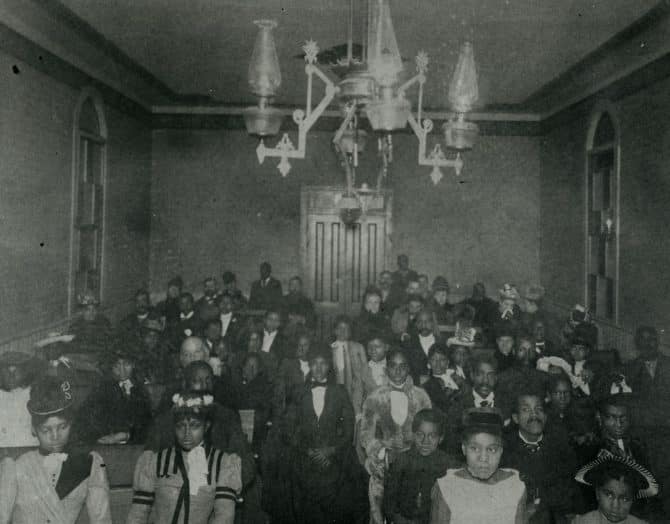
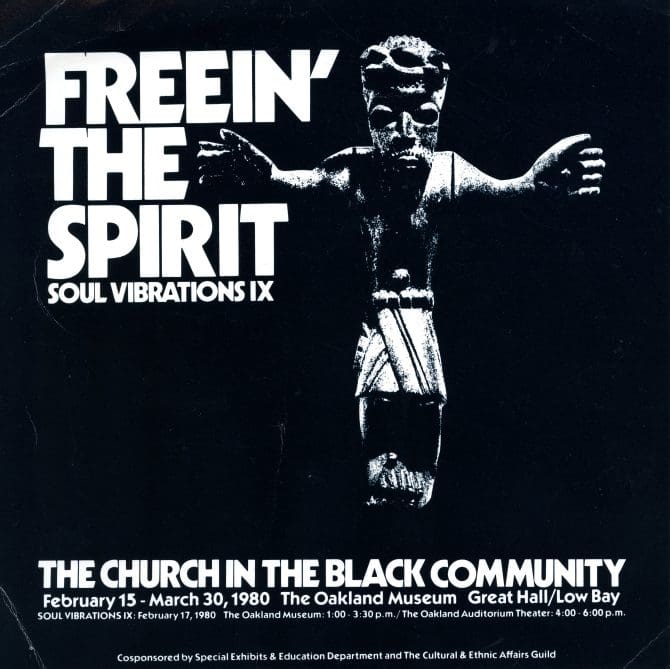
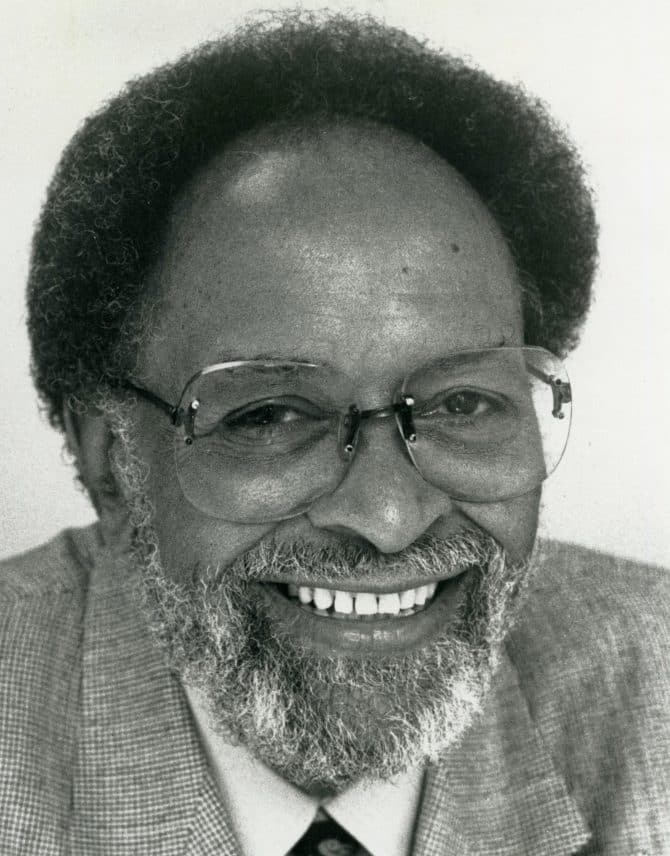
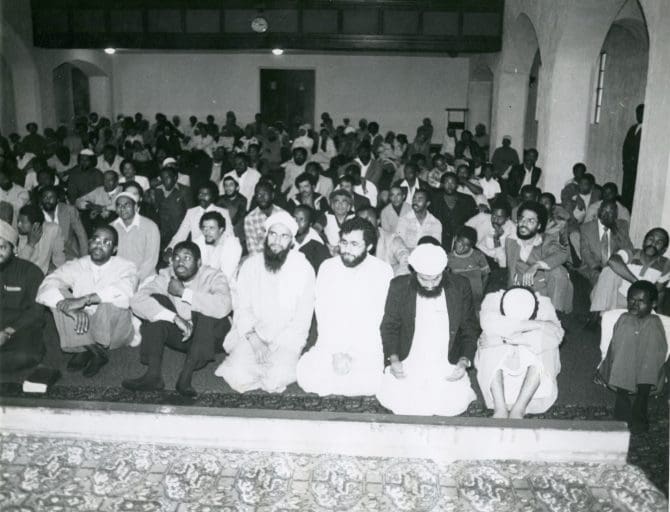
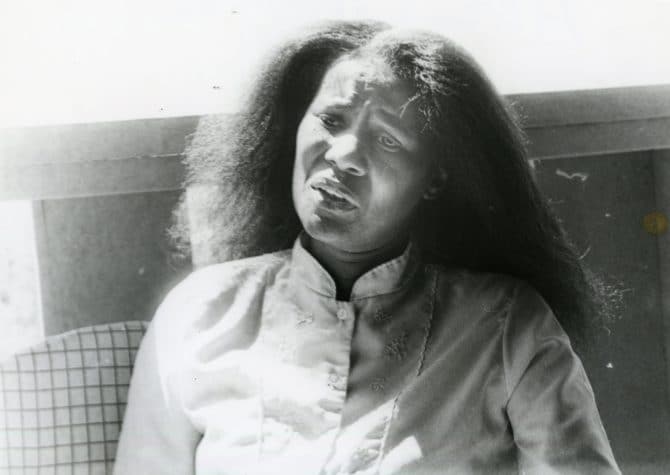
Additional Information
Search the library using the catalog.
Consult AAMLO's finding aids in the Online Archive of California.
We are working to create new resource guides. Have an idea for a new guide? Contact us at aamlo@oaklandlibrary.org.

